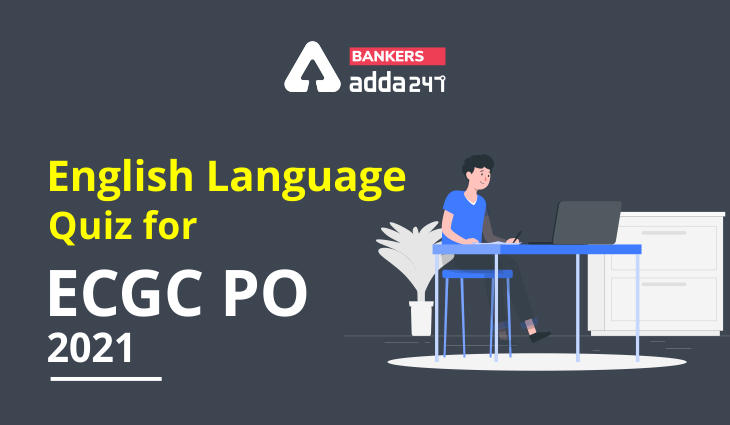Directions (1-10): Read the following passage carefully and answer the given questions. Certain words are given in bold to help you locate them while answering same of the questions.
Rural development in India has witnessed several changes over the years in its emphasis, approaches, strategies and programmes. It has assumed a new dimension and perspective as a consequence. Rural development can be richer and more meaningful only through the participation of clienteles of development. Just as implementation is the touchstone for planning, people’s participation is the centrepiece in rural development. People’s participation is one of the foremost prerequisites of development process both from procedural and philosophical perspectives. For the development planners and administrators, it is important to solicit the participation of different groups of rural people, to make the plans participatory.
Rural development aims at improving rural people’s livelihoods in an equitable and sustainable manner, both socially and environmentally, through better access to assets and services, and control over productive capital.
The basic objectives of Rural Development Programmes have been alleviation of poverty and unemployment through creation of basic social and economic infrastructure, provision of training to rural unemployed and providing employment to marginal farmers/labourers to discourage seasonal and permanent migration to urban areas.
Rural development is the main pillar of nation’s development. In spite of rapid urbanisation, a large section of our population still lives in the villages. Secondly, rural India has lagged behind in development because of many historical factors. Though the 11th Plan began in very favourable circumstances with the economy having grown at the rate of 7.7% per year in the 10th Plan period, there still existed a big challenge to correct the developmental imbalances and to accord due priority to development in rural areas. Ministry of Rural Development is implementing a number of programmes aimed at sustainable holistic development in rural areas. The thrust of these programmes is on all-round economic and social transformation in rural areas through a multi-pronged strategy aiming to reach out to the most disadvantaged sections of the society.
Although concerted efforts have been initiated by the Government of India through several plans and measures to alleviate poverty in rural India, there still remains much more to be done to bring prosperity in the lives of the people in rural areas. At present, technology dissemination is uneven and slow in the rural areas. Good efforts of organisations developing technologies, devices and products for rural areas could not yield high success. Experiences of many countries suggest that technological development fuelled by demand has a higher dissemination rate. However, in India, technology developers for rural areas have been catering to needs, rather than creating demand. There is no industry-linkage machinery to create demand-based-technology market for rural communities. Besides, there is also an imbalance between strategies and effective management programmes. Propagation of technology/schemes for rural development is slow and there is a lacking in wider participation of different stakeholders. An ideal approach may, therefore, include the government, panchayats, village personnel, researchers, industries, NGOs and private companies to not only help in reducing this imbalance, but also to have a multiplier effect on the overall economy.
Q1. According to the passage, which of the following are the objectives of most Rural Development Programmes?
(A) To promote urbanisation
(B) Provide training to youth
(C) Reducing unemployment
(a) Only A and C
(b) Only C
(c) Only B and C
(d) All the three (A), (B) and (C)
(e) Only A
Q2. Which of the following is most nearly the SAME in meaning as the word given in bold as used in the passage?
Alleviation
(a) mitigation
(b) soothing
(c) intensification
(d) outpouring
(e) comfortable
Q3. Which of the following is most OPPOSITE in meaning of the word given bold as used in the passage?
Propagation
(a) generation
(b) producing
(c) reproduction
(d) underdevelopment
(e) growth
Q4. What, according to the passage, is the most important factor of rural development?
(a) Alleviation of poverty and unemployment
(b) Employment to marginal farmers and labourers
(c) Participation of different groups of rural people
(d) Creation of basic social and economic infrastructure
(e) None of these
Q5. Which of the following is true according to the passage?
(A) Urbanisation has resulted in a majority of Indian population living in urban areas.
(B)The economic growth of the 10th Five Year Plan did not translate into proportionate rural development.
(C) The efforts of the Government of India for poverty alleviation have met with complete failure.
(a) Only A and B
(b) Only C
(c) Only A and C
(d) Only B
(e) All the three (A), (B) and (C)
Q6. Which of the following is most nearly the SAME in meaning as the word given in bold as used in the passage?
Touchstone
(a) yardstick
(b) periphery
(c) sensitivity
(d) weakness
(e) hurdle
Q7. According to the passage, what ails the process of technology-aided development in rural areas?
(A) Creation of demand for technology-aided development in rural areas is missing.
(B) There is lack of participation of rural people in the process of technology-aided development.
(C) There is a dearth of appropriate linkages needed for bringing about technology-aided development.
(a) Only C
(b) Only B and C
(c) Only A
(d) Only A and B
(e) All the three (A), (B) and (C)
Q8. Which of the following can be the most suitable title for the passage?
(a) Technology in Rural India
(b) The Rural Indian Communities
(c) Rural Development—The Participative Way
(d) Rural India — Ignored by All the Stakeholders
(e) Rural Development —An Impossible Dream
Q9. What is the current status of the poverty alleviation programme initiated by the Government of India?
(A) Technology dissemination is uneven and slow in rural areas.
(B) There still remains much more to be done to bring prosperity in the lives of the people in rural areas.
(C) There is a lack of participation of different stakeholders.
(a) Only (A) and (B)
(b) Only (B) and (C)
(c) Only (A) and (C)
(d) All (A), (B) and (C)
(e) None of these
Q10. Which of the following is most OPPOSITE in meaning of the word given in bold as used in the passage?
Equitable
(a) troubled
(b) unfair
(c) separated
(d) futuristic
(e) just
Directions (11-15): Rearrange the following six sentences (A), (B), (C), (D), (E) and (F) in the proper sequence to form a meaningful paragraph and then answer the questions given below.
A. This is the result of a growing consensus that far from being a harm-free alternative as claimed by industry lobbies, e-cigarettes could sooner or later lure consumers to take up the real thing.
B. In the U.S., e-cigarettes cannot be sold to people under 18 years of age.
C. In tandem with the latest restrictions on how cigarettes are packaged, the EU and the U.S. have clamped down on the sale of electronic cigarettes.
D. Curiously, it was when the new nicotine-based substitute began to make inroads that some tobacco giants were more willing to acknowledge the toxic chemicals and carcinogens released while smoking.
E. That ruling may still be some time away. But the public health campaign must continue apace with the enforcement of extensive curbs on smoking in public spaces.
F. However, they continue to pin their hopes on a challenge at the WTO, which they are fighting together with countries that have strong interests in the tobacco crop.
Q11. Which of the following should be the FIRST sentence after rearrangement?
(a)A
(b) B
(c) C
(d) D
(e) E
Q12. Which of the following should be the SECOND sentence after rearrangement?
(a)A
(b) B
(c) C
(d) D
(e) E
Q13. Which of the following should be the THIRD sentence after rearrangement?
(a)A
(b) B
(c) C
(d) D
(e) E
Q14. Which of the following should be the FOURTH sentence after rearrangement?
(a)A
(b) B
(c) C
(d) D
(e) E
Q15. Which of the following should be the SIXTH (last) sentence after rearrangement?
(a)A
(b) B
(c) C
(d)D
(e) E
Solutions
S1. Ans. (c)
Sol. The third paragraph of the passage says: “The basic objectives of Rural Development Programmes have been alleviation of poverty and unemployment through creation of basic social and economic infrastructure, provision of training to rural unemployed you.” Hence, (c) is the correct option.
S2. Ans. (a)
Sol. Alleviation means to make (pain, for example) less intense or more bearable. So, mitigation is the word which is similar in meaning to it.
S3. Ans. (d)
Sol. Propagation means the process of spreading to a larger area or greater number. So, underdevelopment is the word which is opposite in meaning to it.
S4. Ans. (c)
Sol. The first paragraph of the passage says: “People’s participation is one of the foremost prerequisites of development process both from procedural and philosophical perspectives.” Hence, (c) is the correct option.
S5. Ans. (d)
Sol. The passage says “Though the 11th Plan began in very favourable circumstances with the economy having grown at the rate of 7.7% per year in the 10th Plan period, there still existed a big challenge to correct the developmental imbalances and to accord due priority to development in rural areas.” So, only (B) option is true.
S6. Ans. (a)
Sol. Touchstone means an excellent quality or example that is used to test the excellence or genuineness of others. So, yardstick is the word which is similar in meaning to it.
S7. Ans. (e)
Sol. The passage says “There is no industry-linkage machinery to create demand-based-technology market for rural communities. Besides, there is also an imbalance between strategies and effective management programmes. Propagation of technology/schemes for rural development is slow and there is a lacking in wider participation of different stakeholders.” So, all the given options are true.
S8. Ans. (c)
Sol. ‘Rural Development—The Participative Way’ is the most appropriate title of the passage.
S9. Ans. (d)
Sol. The last paragraph of the passage says: “there still remains much more to be done to bring prosperity in the lives of the people in rural areas. At present, technology dissemination is uneven and slow in the rural areas. Good efforts of organisations developing technologies, devices and products for rural areas could not yield high success.” So, all the given options are true.
S10. Ans. (b)
Sol. Equitable means fair and impartial. So, unfair is the word which is opposite in meaning to it.
S11. Ans. (c)
Sol. The current sequence is CBADFE.
S12. Ans. (b)
Sol. The current sequence is CBADFE.
S13. Ans. (a)
Sol. The current sequence is CBADFE.
S14. Ans. (d)
Sol. The current sequence is CBADFE.
S15. Ans. (e)
Sol. The current sequence is CBADFE.
Practice with Crash Course and Online Test Series for ECGC PO 2021:
- ECGC Online Coaching Classes for Probationary Officier 2021
- ECGC PO Mock Tests 2021 – Banking Online Test Series (With Solutions) by Adda247
- ECGC PO 2021 Complete eBooks Kit (English Medium)
Click Here to Register for Bank Exams 2020 Preparation Material



 English Language Quiz For Bank Foundatio...
English Language Quiz For Bank Foundatio...
 English Language Quiz For SBI Clerk Prel...
English Language Quiz For SBI Clerk Prel...
 English Language Quiz For SBI Clerk Prel...
English Language Quiz For SBI Clerk Prel...



